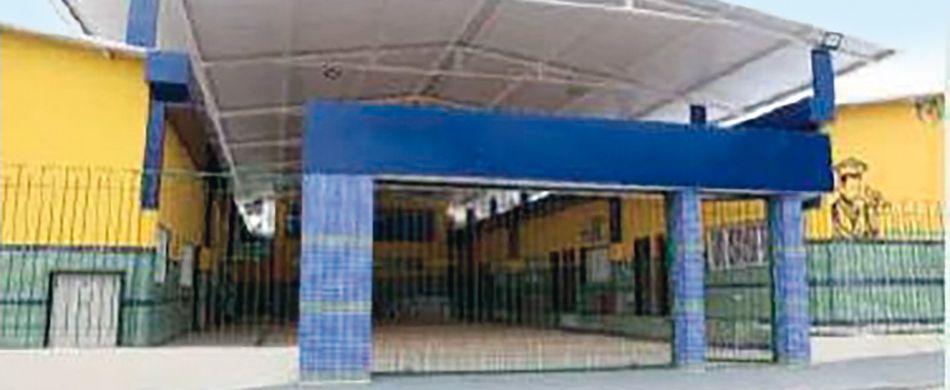New Tomorrow
LIMOEIRO is situated in the North-Eastern Brazilian state of Pernambuco in the Capibaribe River basin, 77 km from the state capital, Recife. It has a population of around 56,000, 80 percent of whom live in urban areas with the remaining 20 percent in rural zones.
There are no industries here, and most of the families survive on money earned from small occasional jobs. Financial resources are limited. Around 10 percent of the population survive only with help from government social programs and have a monthly income of less than a quarter of the minimum wage, which is R$220 (around €35). A further 18 percent survive on just R$440 per month, half the minimum wage.
Father Patalo
“Understandably, the lack of financial resources has a negative impact on the inhabitants of the area, and they have difficulty accessing basic education, health care, and employment,” explains Father Sander Patalo of the Poor Servants of Divine Providence, or Calabrians. “It’s in this context that the Father Luigi Cecchin Institute carries out its activities, assisting over 900 children, adolescents, young people and families in the sectors of Nursery School, Social Education, Professional Courses, and Family Agriculture.”
The Institute was founded in 1948 as a nonprofit philanthropic, educational and cultural project with the purpose of providing social assistance to the poorest and most marginalised social groups. Since 2011 it has been directed and managed by the Poor Servants of Divine Providence, a religious order founded by St. John Calabria in Verona in 1907. The professional courses run by the Institute educate and prepare around 220 young people and adults every six months, who would otherwise most likely leave the region or settle for menial or occasional jobs.
Obsolete facility
“The laboratories at the Institute were built with methods and materials from a few decades ago and needed to be restructured,” says Father Patalo. “In 2020 we started out with the belief that we could change the corrugated roofing for an isothermal material to prevent the labs from becoming real ovens during the summer season. But we then realised that the load-bearing structure was inadequate. In addition to that, new Brazilian federal regulations required us to change the restrooms. It became obvious that we would need to completely renovate the building in order to comply with the new regulations.”
A project was drawn up to replace the old wooden-beam roof and its asbestos slabs with prefabricated iron trellises to be painted on site and ‘sandwich’ panels, which would be resistant to both sound and heat. It would also be necessary to reinforce the load-bearing structures, create new ventilation and lighting points, plaster and whitewash all the walls, renew the electricity and plumbing systems, and install toilets and changing rooms for each department. Care would also be taken to ensure accessibility to all pupils.
Three phases
The total cost of the reconstruction and renovation work would be €85,000. A contribution of €25,000 had already been raised from other benefactors and St. Anthony’s Charities was pleased to grant the €60,000 necessary to complete the works.
The first tranche of funds was used to purchase building materials and to pay for part of the electrical installation work, construction of roof structures, plumbing, wall painting, and the installation of guttering. “We also created two areas for storage of fabrics and materials for use in the sewing classes, together with rooms for trying on the clothes made,” explains Fr. Palato. “In other areas, such as that for the carpentry courses, all the electrics were replaced and ceramic flooring laid.”
The second instalment funded the purchase of more materials and much of the funds went to replacement of the electrical systems in classrooms and external areas. This was also the phase when aluminium windows and doors were fitted, railings and gates installed at the entrance of the building for better security, and disabled access ensured. “We were also able to create a small garden to ‘beatify’ the central area,” says Fr. Palato.
The third and final phase of the project ran into some difficulties. “Due to the economic crisis some materials even tripled in price,” Fr. Palato continues. “Heavy rains which had even caused some houses in the region to collapse also created difficulties for us in creating the foundations for restrooms. These had to be redone several times.” Perhaps one of the biggest upsets, though, was that thieves came and stole not only materials, but the workers’ tools. Not just once, but twice. They even tried to take the engine from the cement mixer. In spite of these difficulties, after replacement of the tools and materials, works were finally completed.
Immense gratitude
“In December 2022, 132 young people were able to complete courses in sewing, IT, carpentry, and mechanical turning,” says Father Osmair José Collazziol, Director of the Institute. “Completing these courses is a life-changer for many. Their testimonies give us the certainty that the mission is offering people an opportunity for transformation.
“There is one young man in particular we would like to mention. He is an ex-prisoner and had no prospects for his future. But now he has become an entrepreneur after completing his learning at our institution.”
“We are all immensely grateful to St. Anthony’s Charities and the readers of the Messenger of Saint Anthony for enabling us to provide dignity and professionalism to the most needy of our city,” concludes Fr. Osmair. “We consider you to be collaborators in transforming people’s lives.
“With the COVID-19 pandemic under control, we’re already eager to intensify our courses as they provide an enormous opportunity and hope to the youth. Our commitment and responsibility towards the poorest is vast, but thanks to God and to you, we will be able to continue creating opportunities for a new tomorrow. You can always count on our prayers.”



